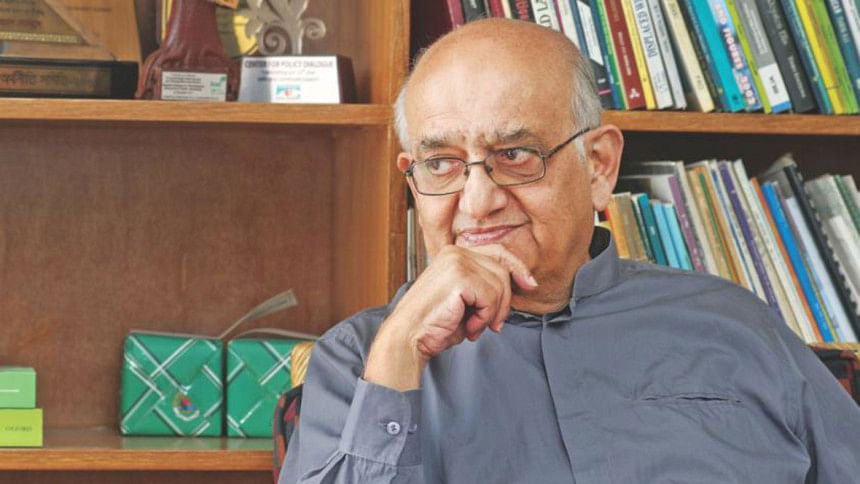Rehman Sobhan: A public intellectual extraordinaire

Professor Rehman Sobhan turns 86 today. Born in Kolkata into an illustrious family, with connections to the Nawab family of Dhaka from his mother's side and a reputed Murshidabad family from his father's side, Sobhan had no business to be a champion of the poor and the downtrodden. His father was trained at Sandhurst and held a senior post at the Police Department in Kolkata, yet in his maturity Rehman Sobhan stood firmly on the side of the oppressed.
Educated at St. Paul's at Darjeeling, where he divided his time between sports and debate excelling in both, it is hard to believe now that once he was a long-distance runner. After finishing college at the Aitchison College, Lahore, he went to Cambridge University where he studied with Joan Robinson and others on the left, who shaped his intellectual orientation. His circle of friends at Cambridge included Amartya Sen, Mahbubul Haque, and Manmohan Singh. Sobhan was elected the president of Majlish, the South Asian students' association, and hosted the Indian Prime Minister and Cambridge alumnus Pandit Nehru.
His privileged and somewhat sequestered upbringing took a toll on his Bengali language proficiency for which he almost paid a heavy price that could cost his life. Shortly after the Pakistani military crackdown in Dhaka on March 25, 1971, Rehman Sobhan, a close ally and confidant of Bangabandhu, was on the run. He was captured at the border by Mukti Bahini loyalists who thought he was a "non-Bengali". His life was spared as a student of Dhaka University spotted and identified him as one of the most important pro-Bengali and pro-Bangladesh intellectuals in the then Pakistan.
Professor Rehman Sobhan joined Dhaka University, freshly minted from Cambridge, at the young age of 22 in 1957. Dhaka University was then a bastion of opposition politics. The professors—with few exceptions—spoke truth to power. Rehman Sobhan was no exception. Naturally aligned with the downtrodden, despite his elite upbringing, Sobhan spoke at a conference in Pakistan in 1961 vigorously presenting his two-economy theory when someone reminded him that Pakistan was under the martial law. Such small inconveniences did not deter him.
His outspokenness and sympathy for the fellow Bengalis brought him closer to Bangabandhu. Along with Professor Nurul Islam and other illustrious economists of Dhaka University, he worked closely not only as a confidant of Bangabandhu but also managing the day-to-day running of the de facto administration in the heady days between March 5 and 25, 1971, when the government functioned autonomously under the leadership of Bangabandhu and his associates.
During the liberation war, Sobhan, a superb communicator, was given the responsibility of a roving ambassador to drum up support for Bangladesh and help stymie aid and other economic assistance to Pakistan. In December 1996, when 25 years of Bangladesh's independence was celebrated at Columbia University, New York, I was there to witness Rehman Sobhan's reminiscence about his days in the United States drumming up support for the Bangladesh cause. As he narrated his experience, Dr. Shelley Feldman, a researcher on Bangladesh and a friend who sat next to me, nudged me and whispered: "I wish I could speak like him." What an endorsement! His power of articulation is amazing. Many of us who falter, fumble and grope for the right words while delivering a speech in English were stunned by his power of articulation.
Rehman Sobhan, an economist who writes without complicated equations and algebraic symbols in plain but elegant prose, is accessible to a wider audience. This is the hallmark of a true public intellectual. Michael Burawoy at the University of California, Berkeley, USA, a leading proponent of public sociology, advised me to write for the popular media to share sociological knowledge with the public. Sobhan has been at the service of popularising economics to the public since his publication of the Forum in the late 1960s. As a college student, I would save money to buy Weekly Forum to read his penetrating analyses of the political economy of Pakistan. His fellow travellers in those days were Hameeda Hossain, Dr Kamal Hossain and other luminaires of the time. The magazine set the intellectual agenda of that time, bringing deep analyses backed by evidence at the heart of the public debate.
Following the independence of Bangladesh, Sobhan was invited to join Bangladesh Planning Commission. Following the tragic murder of Bangabandhu and most of his family in August 1975, Professor Sobhan was in exile for a number of years. After his return to Dhaka, he found himself at the helm of Bangladesh Institute for Development Studies (BIDS), and later he founded the Centre for Policy Dialogue (CPD), where he was able to bring pro- and anti-government politicians, civil servants, and academics around the same table to debate and deliberate on issues of national importance, an astounding feat in a fractious society like that of Bangladesh.
He has been an institution builder all his life, shaping the minds of thousands of students in his long career as a professor of economics and through BIDS and now CPD. Once a marathon runner at St. Paul still continues to run. May the Almighty give him strength to continue to serve Bangladesh.
Habibul Haque Khondker is a professor of social sciences at Zayed University, Abu Dhabi, UAE.

 For all latest news, follow The Daily Star's Google News channel.
For all latest news, follow The Daily Star's Google News channel. 



Comments